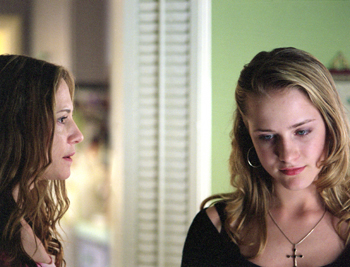![[Metroactive Movies]](/movies/gifs/movies468.gif)
[ Movies Index | Show Times | Silicon Valley | Metroactive Home | Archives ]
Growing Up Is Hard to Do: Tracy (Evan Rachel Wood, right) can't connect with her mother (Holly Hunter) in 'Thirteen.'
Little Miss Miscreant
'Thirteen' depicts the trials of growing up too quickly among the stresses and strains of girl culture
By Traci Vogel
THIRTEEN IS NOT a lucky number, particularly when you're a girl growing up in America. Remember when youthful folly had a limited menu? You'd attend a few illicit keggers, TP a few houses, water-balloon a few school principals. These days, folly's repast includes piercings, tattoos, guns, a variety of eating disorders, shoplifting, self-mutilation and drugs. And sex, of course, but that's always been there. It is possible to believe, however, after viewing director Catherine Hardwicke's disquieting based-on-real-life film Thirteen, that sex has gone from an adolescent temptation to being as meaningless as a glittery barrette. Truly, sex is just an accessory in the lives of the 13-year-olds Hardwicke portrays, a thing that ensures the girls' value in a world where MTV rap videos delineate reality.
Tracy (Evan Rachel Wood) starts out as a good kid, successful academically, affectionate toward her divorced mother, Mel (Holly Hunter). Thrust into the competitive world of middle school, Tracy notices how much attention the cool girls get--particularly one Evie Zamora (Nikki Reed, now 15, also co-writer of the script). After Evie makes a contemptuous comment to her, Tracy decides to pursue her, transforming herself into one of Evie's Charlie's Angels-tressed followers.
Following Evie comes with an armory of complications, and Tracy just doesn't have the emotional stability to field the bombardment. Her transformation is dramatic but believable, filmed with battlefield intensity. Suddenly, Tracy dresses like she's 18, huffs anything in an aerosol can, skips school to shoplift and carves her confusion on her skin with a sharp pair of nail scissors. The tiny rundown rental she shares with her mother turns into a folding house of cards, doors slamming, windows opening for midnight escapes. Mel's own substance-abuse problems, and those of her boyfriend, threaten like a distant hurricane. Holly Hunter's portrayal shelters Mel from stereotypical martyred motherdom--Mel pops with three-dimensionality. But it is Evan Rachel Woods' Tracy who both allows the film its laudable rawness and cuts it short of melodrama.
Thirteen falls somewhere between the utter hopelessness of Larry Clark's Kids, the moral claustrophobia of Watching the Friedmans and an after-school special. Filmed in 26 days with hand-held cameras, including a Super-16, its documentary feel adds to its sense of shaky desperation. When the climactic scene unfolds, it's almost as if we're watching over Tracy's shoulder, seeing the contents of what has become her life spill onto her mother's coffee table. Thankfully, Thirteen doesn't try and offer simple answers, and the fact that we're never quite sure what part of the truth the girls don't understand saves the ending from being clichéd. Instead, Thirteen ends up being a powerful portrayal of the dark side of girl culture.
[ Silicon Valley | Metroactive Home | Archives ]
![]()

Photograph by Anne Marie Fox
Thirteen (R; 100 min.), directed by Catherine Hardwicke, written by Nikki Reed and Hardwicke, photographed by Elliot Davis and starring Evan Rachel Wood, Holly Hunter and Reed, opens Friday at Camera One and Century 25 in San Jose and the Guild in Menlo Park.
Send a letter to the editor about this story to letters@metronews.com.
From the August 28-September 3, 2003 issue of Metro, Silicon Valley's Weekly Newspaper.